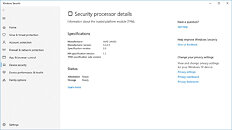Tuesday, June 29th 2021

Microsoft Considers Tweaking Windows 11 TPM Requirement to Include Zen 1 and 7th Gen Core
In more reason why Microsoft's requirement for hardware trusted platform modules for its upcoming Windows 11 operating system is arbitrary, the company revealed that it is willing to tweak the hardware TPM system requirements to accommodate platforms from 2017, which include the very first generation of AMD "Zen" (Ryzen 1000 series), and Intel 7th Gen Core "Kaby Lake." In a Windows Insider blog posted dated June 28, Microsoft explained in brief why Windows 11 needs TPM 2.0 hardware, and that the "PC Health Check App," the software tool Microsoft is giving users to check whether their PCs measure up to Windows 11, has been temporarily removed from the website while they work on getting its accuracy right.
Source:
Windows Insider Blog
"The intention of today's post is to acknowledge and clarify the confusion caused by our PC Health Check tool, share more details as to why we updated the system requirements for Windows 11 and set the path for how we will learn and adjust. Below you will find changes we are making based on that feedback, including ensuring we have the ability for Windows Insiders to install Windows 11 on 7th generation processors to give us more data about performance and security, updating our PC Health check app to provide more clarity, and committing to more technical detail on the principles behind our decisions. With Windows 11, we are focused on increasing security, improving reliability, and ensuring compatibility. This is what drives our decisions.In the blog, Microsoft explains that a hardware TPM is required for secure credentials storage, to drive features such as device encryption, Windows Hello biometrics, virtualization-based security (VBS), and hypervisor-protected code integrity (HVCI) and Secure Boot. Most modern processors include a TPM 2.0-compliant on-die TPM, some even have features such as VBS and whole-memory encryption.

59 Comments on Microsoft Considers Tweaking Windows 11 TPM Requirement to Include Zen 1 and 7th Gen Core
Secure Boot requires UEFI, that comes in at 5th Gen in a patchy way I'm pretty sure, and was only default by 7th gen, and wasn't available on Piledriver or Bristol.
TPM 2 was only supported from 8th Gen and Zen+ and up.
Makes sense when looked at from a 50 foot view I guess, although time to include TPM 1.2 and anything that supports Secure Boot, which should extend down to some 5th gen parts.
improved security? really? so my core 2 duo laptop or core 2 quad pc which run windows 10 just fine are super insecure and therefor irresponsible to use for windows 11
I mean this is just begging for hacked windows 11 vids where people show it runs just fine on older hardware....I swear sometimes its like companies work to have techyoutubers have content for their vids....
As for there new security stance, I’m all
For it. It’s seriously about time someone attempted to fix the low hanging fruit in the PC industry.
AFAIC the people that are against this are literally part of the problem. One small step removed from being responsible for your last ransomware infection.
This whole saga is a fantastic load of crap.
I mean, there are so many good systems that don't need an upgrade (xeon v1-v3's still have enough power for general usage..... ) that would still work absolutely fine with windows 11..... if it wouldn't be for the TPM requirement
and, that it's not on the list of supported cpus ...... which states 1Ghz minimum .... but Gen8+ .... slight oxymoron .....
A few hours ago a Microsoft support agent told me that they're gonna change the hardware requirements!
We also talked about older platforms like AMD FX which has a TPM header and he said that you can install the OS without problem if you get a TPM Module.
We just have to wait and see what happens. it's not finished yet.
such secure
much encrypt
very safe
wowe
In other words a system may support TPM but still be completely open to any kind of attack.